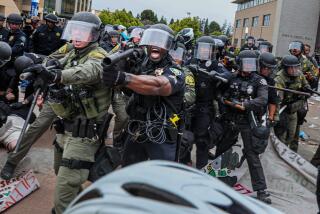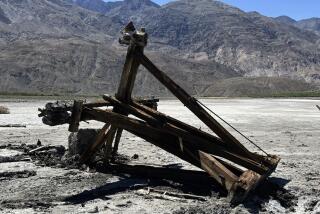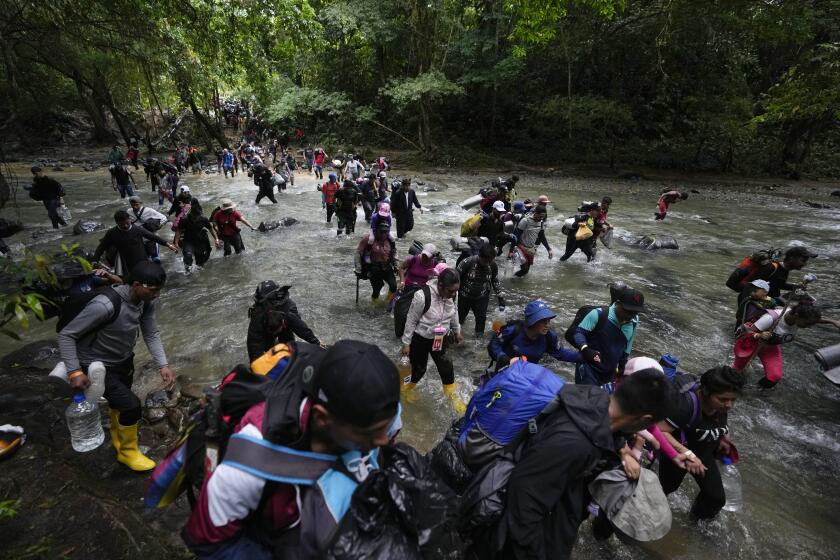Lee Case Proved to Be an Awakening
The Wen Ho Lee case has taught Clara Liu the risks of playing it safe.
The former Los Alamos National Laboratory scientist’s battle against espionage charges hit home for Liu, a 50-year-old aerospace engineer, and other Chinese immigrants who sought security in professions where they thought they would be judged by their skill with numbers and not their speaking ability or skin color.
Those presumptions were shattered when Lee, a 20-year veteran of the prestigious New Mexico defense laboratory, found himself at the center of a controversial spy case that imploded amid charges of racial profiling and government misconduct.
“It cautions me to be very careful to walk a straight line,” explained Liu, who works in classified research at Boeing Co.’s facility in Anaheim.
Lee’s release from prison Sept. 13 followed an 18-month legal battle and a plea bargain widely seen as embarrassing to the government. For many Chinese Americans, his highly visible ordeal triggered a personal and political awakening.
Indeed, having learned a hard lesson about playing it safe politically, Chinese Americans now are mobilizing for the next phase of Lee’s battle. Some have called for an investigation into charges the Taiwan-born naturalized citizen was unfairly targeted by U.S. officials because of his ethnicity. Others want a presidential pardon for Lee, who is pursuing a civil suit against the government.
At a weekend fund-raiser in Montebello, Calif., Lee’s daughter, Alberta, told 150 Chinese American supporters that the best way to protect themselves is to get involved in politics.
“Don’t take freedom for granted; don’t take civil rights for granted,” the 26-year-old technical writer from San Francisco warned. “My father didn’t vote. He didn’t read newspapers. He didn’t care about politics. And it ended up hurting him.”
Government’s Case Quickly Fell Apart
After Lee’s arrest in December, federal investigators and some media reports fueled images of a wide Chinese espionage conspiracy. Later, the case against Lee seemed to stall, then fray, amid a public outcry about the unusually harsh treatment given the 60-year-old scientist. Finally, the government dropped 58 charges and Lee pleaded guilty to one count of mishandling classified data and was released from prison after spending nine months in solitary confinement. He also agreed to answer questions about why he had downloaded sensitive nuclear weapons materials onto an unsecured computer.
U.S. Atty. Gen. Janet Reno--who defended the government’s handling of the case despite criticism from the presiding judge and, later, from President Clinton--announced Friday she had authorized an internal investigation into her agency’s actions. Sen. Arlen Specter (R-Pa.), the head of a Senate Judiciary task force that looked into the charges of Chinese espionage, has scheduled a hearing Tuesday on the Lee case.
Many Chinese Americans acknowledge they were at first confused, then ashamed by Lee’s case. Even when disquiet turned to disgust, the community was slow to respond. But what some call a cultural reluctance to make waves finally was overtaken by an unusually broad grass-roots movement that sought Lee’s freedom while keeping the issue of racial profiling alive outside the courtroom.
“This case shows, perhaps for the very first time, that when Asian Americans are organized . . . we can influence the course of events,” said Frank Wu, a Howard University law professor and author of a forthcoming book titled “Yellow: Civil Rights Beyond Black and White.”
Lee’s legal battle galvanized many different slices of America’s diverse Chinese American population, pulling in first and fifth generations, Mandarin and Cantonese speakers, civil rights activists and physicists. One reason his experiences resonated so deeply was because his life story so directly challenged the presumption of safety upon which many middle-class Chinese Americans had built their lives.
“This was a major wake-up call,” said Henry S. Tang, a businessman and leader of the Committee of 100, a New York-based group of prominent Chinese Americans that includes architect I.M. Pei and AIDS researcher David Ho. “No matter how accomplished, no matter how educated, no matter how wealthy, no matter how loyal, one could still become suspected of activities counter to the interests of this country.”
The Lee case also followed four years of domestic political controversies linked to mainland China--from allegations of illegal fund-raising to espionage. It was yet another painful reminder to Chinese Americans that as long as the stereotype of “perpetual foreigners” persisted, they were in danger of getting caught in the middle.
“We needed something so shocking and terrifying that it got people to leap out of their inertia,” said movie producer Janet Yang, whose work includes “The People vs. Larry Flynt” and “The Joy Luck Club.”
Some saw disturbing echoes of another dark period, when 120,000 U.S. citizens of Japanese descent were placed behind barbed wire because they were considered security risks after Japan bombed Pearl Harbor, drawing the U.S. into World War II.
Alberta Lee, who was thrust into the role of her father’s chief advocate, said in a recent interview that “no one could better understand my father’s case than people in the Chinese American community, people who thought that if they were in science they would be left alone to get ahead.”
But when she and Cecilia Chang, a family friend, initially sought help from leaders of the Chinese American community, they found few willing to publicly support a man perceived to be so dangerous he was in solitary confinement, shackled and under 24-hour watch.
The younger Lee has told Chinese American audiences how painful it was to have even close family friends turn away. But she now describes their initial hesitation as “understandable” given the “extremely negative” articles about her father.
“People didn’t really know what to think,” said Lee, who has decided to pursue a career in law as a result of her father’s travails.
That was certainly true for David Lee, a 60-year-old environmental specialist for the state of California. He was part of a wave of immigrants who fled to the U.S. after Communist-led riots rocked Hong Kong in the mid-1960s.
As an officer with a Southern California Chinese college alumni group, Lee (no relation to the Los Alamos scientist) helped organize social events for the graduates of 30 universities in Taiwan, Hong Kong and mainland China. Politics wasn’t on the agenda for these immigrants, who preferred to steer clear of controversy. But by late last year, the alumni board couldn’t ignore the alleged spy whose face dominated newspaper headlines and the evening news.
David Lee is a mathematician by training. He doesn’t jump to conclusions. He tries to keep his emotions in check. As more evidence emerged, however, he grew convinced the embattled scientist was the subject of a grievous injustice.
Made to Feel Like Criminals at Work
Key prosecution witnesses admitted they had provided false or misleading testimony. Others, including former CIA Director John M. Deutch, were revealed to have illegally transferred classified information to their personal computers, the violation Lee was eventually convicted on. Deutch has not been charged with any crime.
“I am the one who dreamed of freedom and justice in this country,” explained Lee, who is a naturalized citizen. “I want a country that is fair to all its citizens.”
Within a few months, Lee and others in the alumni group--including Liu--were hitting the streets with petitions, collecting funds and organizing a protest at the Democratic National Convention.
As the outrage spread, other Chinese American groups--including the Committee of 100 and the Organization of Chinese Americans, a Washington-based civil rights group--joined in.
Morale at national defense facilities plummeted, particularly among scientists of Asian descent. They complained that the beefed-up security made them feel like suspected criminals. Some, including at least five from Los Alamos, left for other jobs.
Such concerns prompted a controversial employment boycott of the national defense labs spearheaded by UC Berkeley professor L. Ling-Chi Wang. His concern: “Why should Asian Americans walk into a situation where they could become the second, third or fourth Wen Ho Lee?”
Ongoing U.S.-China tensions, including the Chinese espionage charges, have spurred fears of racial profiling elsewhere. Ming Louie, a 53-year-old scientist who fled China in 1968, helped design Globalstar Inc., a satellite telecommunications firm whose leading shareholders include Loral and Qualcomm Inc. China was considered a primary market because of its huge land mass and primitive telephone system.
Louie and other Chinese Americans at Globalstar came under scrutiny when Loral was accused of revealing military secrets to China during the follow-up to a failed 1996 rocket launch. The company insisted its employees had done nothing illegal. A grand jury has been investigating those charges for more than two years.
The frustrated satellite specialist finally left Globalstar last summer, convinced he couldn’t escape the specter of disloyalty. He said his Chinese American colleagues have begun avoiding China projects because they are always working under “unjustified suspicion.”
Louie, a naturalized U.S. citizen, has returned to China in what he hopes will be a less controversial role, as the head of China operations for Qualcomm. While he remains grateful to his adopted home for giving him the chance to start over, he would not want his three children to follow his path given the “strong anti-foreign and anti-Chinese sentiments in the defense industry.”
“We have to become more involved in the political process, rather than [be] a bystander like before,” Louie said.
Lee’s Legal Tab Hits $1.5 Million
Liu, the Boeing engineer, fears Chinese Americans will fall back into their old ways now that Wen Ho Lee is free, closing up their pocketbooks and retreating to the safety of their homes and jobs. The Chinese American community has contributed the lion’s share of the $500,000 in Lee’s legal defense fund, but his bills already total $1.5 million.
Just a few days ago, Liu was driving home from work when she heard a local radio talk show host make some “very ignorant” comments about the Lee case. She tried, unsuccessfully, to call the show.
Like many immigrants, Liu said, she used to hold back in conversations, embarrassed by her accented English. She also avoided challenging others, even people she considered friends.
That Clara Liu is gone. “One of my colleagues at work says, ‘You Chinese keep things to yourself. We don’t even understand who you are.’
“I’ll tell you who we are. We are citizens. We are just as much of a patriot as people who were born here. We don’t want to be treated as a visitor.”
More to Read
Start your day right
Sign up for Essential California for news, features and recommendations from the L.A. Times and beyond in your inbox six days a week.
You may occasionally receive promotional content from the Los Angeles Times.






